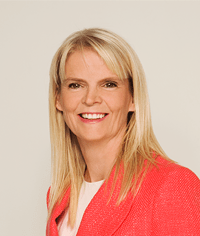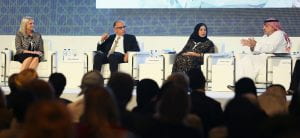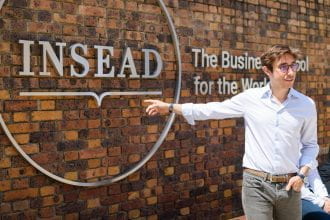 “It was exciting to start with a blank sheet of paper in 2011, knowing that what we created would be pioneering for private firms in the GCC,” said quietly-determined Imelda Dunlop, MBA’97D CEO of the Pearl Initiative, the not-for-profit business-led organisation focused on raising standards of corporate accountability, governance and transparency in the Arab world.
“It was exciting to start with a blank sheet of paper in 2011, knowing that what we created would be pioneering for private firms in the GCC,” said quietly-determined Imelda Dunlop, MBA’97D CEO of the Pearl Initiative, the not-for-profit business-led organisation focused on raising standards of corporate accountability, governance and transparency in the Arab world.
“Around four years ago, nobody in the Gulf Region was talking openly about anti-corruption, business integrity and transparency. I was asked by the initial group of prominent regional business leaders to drive the private sector to take a lead on these sensitive issues, mobilise networks and help make progress, for the good of the business community and the regional economy as a whole. Since then, we have put a lot of effort into framing the issues in a way that is sensitive, constructive and non-threatening, thereby developing a credible, trustworthy and influential reputation for sharing insight and good practices and finding solutions together.”
Today, people from outside the region are often surprised at how openly these corporate governance issues are discussed. The value of Imelda’s soft skills has helped create a platform for the private sector (mainly family firms) to join the dialogue, engage and take a lead. She was also able to identify the strength and confidence in the collective voice and collaborative action.
When it comes to governance and succession matters, family firms recognise that this is a long journey without an end, so they need to break it up into bite-sized manageable pieces to implement. To help in this process, many consulting firms go in and put all their efforts into writing documents and constitutions, but that’s not where the main problems lie. The real challenges, and hence the focus, needs to be on communication, buy-in, relationships between members, succession planning and mediation for conflicts. And it is vital to understand that the extended family is an extremely important part of the local Gulf culture, probably more so than in most other regions.
Looking forward, Imelda believes that they have created a unique model for the private sector and she would like to find ways to see this model replicated more widely geographically. However, in a relationship-driven economy such as this one, she warns that you need a high level of personal commitment from prominent local business leaders in order to impact long term change.
Imelda’s almost innate ability to understand the nuances of Middle Eastern culture come from her early exposure to cultural diversity, growing up partly in the UK and partly in Jamaica where her father was sent as an advisor to the Jamaican government in the 1970s. Then, after her four years stint in South Africa, in 1997 she chose to get her MBA from INSEAD with the main purpose of surrounding herself with people from all over the world who could view life from global and differing perspectives. “It was the only truly international MBA; I wanted to learn about diverse approaches to issues and problem solving”.
 “I have always been interested in how we can find win-win situations that benefit business and society,” Imelda shares, as she reflects on her intrinsic values of integrity, hard work and commitment, which spill over into all that she does. “I think hard work, energy and resilience count for a lot and people should not expect things to come too easily.”
“I have always been interested in how we can find win-win situations that benefit business and society,” Imelda shares, as she reflects on her intrinsic values of integrity, hard work and commitment, which spill over into all that she does. “I think hard work, energy and resilience count for a lot and people should not expect things to come too easily.”
And Imelda has succeeded through sheer focus, determination and an attitude of ‘just getting on with it’. When she was a director at the World Economic Forum, with huge responsibilities and lots of travel, she was also expecting her second child. Her unique ability to discern and focus on what is really important brings out depths of hidden energy, and somewhere between her modest nature and thick skin, Imelda has found some simple answers to success. “I started my career as an engineer in a male-dominated environment, and I’ve just learnt to focus on getting the job done. I don’t complain about situations or get easily offended. Developing an inner strength of conviction and focusing on what’s important have helped me consistently challenge norms and outperform expectations.”
As a young 26-year old in charge of an engineering division in South Africa in the early 1990s, a role which had previously been held only by men over 50, Imelda remembers it being a baptism of fire that toughened her more than anything. “It was an exciting time, with Mandela out of prison and the nation preparing for its first democratic elections – everything had to be revamped, redone, re-launched and repositioned for vast changes in the market and an influx of new investors.”
As a successful career woman, Imelda discloses that she could not have balanced her home and work life without her supportive husband (successful in his own right as the regional head of the global accounting body ACCA) who believes that it is his job to share the load in juggling kids and home. They have a rule that they never travel at the same time, so that one of them can always be there for their two girls. Finding a mature work environment that measures output and achievements rather than number of hours at the desk, planning ahead of time and smart organisation skills have helped Imelda and her husband impact business and yet make sure one of them is there for the girls’ sports matches. Generally someone who comes across as quite under-stated, Imelda advises women, “Speak up and make sure you are getting rewarded the same as your male peers; you can’t take it for granted.”
Besides a progressive father who encouraged his three daughters, the memoir of Vera Brittain (one of the early woman to get an Oxford degree) Testament of Youth had quite an influence on her – it talks about not having any limitations, the importance of having a “useful” life and doing things that make a difference. Something that she believes INSEAD as an institution can do in this region.
“I’d like to see INSEAD grab the opportunity to contribute to knowledge creation in the Middle East region, with the Abu Dhabi campus truly becoming a third point of a global triangle, which would be incredibly powerful. The status quo is not interesting, but it will take a leap of faith for change to occur. This is a challenging region to get things off the ground and will require lots of personal energy and champions to lead the way.”


